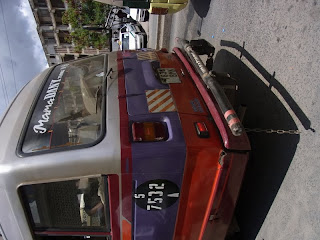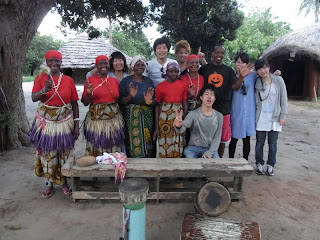It was a sunny day in Tanzania, much humid and hotter than Ethiopia (since we switched our airplane at Ethiopia).
We were all a bit nervous to meet our friend Natsuki and her friends.
Moreover, I personally was nervous about this trip, my first time landing on the continent of Africa.
But all those fears and worries went away when we saw Natsuki waiting for us at Dar es Salaam airport with a big smile on her face.
Everything seemed fresh; the view from the taxi, the town, the people.
It was still hard to believe that we were actually in Tanzania.
It was much peaceful and a bright place to me from what I've been hearing about Africa.
After reaching to the Jambo Inn hotel, we planned our schedule and walked around the city.
The local supermarket we went seemed to have many British, Western food or I should say snacks. Comparing with the other African food, those imported chocolate bars were quite pricy.
Speaking of food, it was our first time of tasting the local African food.
Before dinner, we tasted some kind of grilled corn and a fresh coconut juice.
For dinner, we went to an open terrace restaurant, ate a real local food which you can see in the photo.
One thing that we realized is how banana in Tanzania has different kinds of flavors.
The fried banana we had for dinner tasted like potato but the little banana we had for the next morning breakfast tasted like grape.
However, since there are so many bananas at the market, it was understandable why people in Tanzania eat banana as their staple food.
Another thought was how much the cell phone plays a big role in Tanzanian people's life. Because it is not affordable to buy a computer, the cell phone is the method to use the Internet. We saw so many advertising display of cell phone companies in the city of Dar es Salaam which tells the significance of the mobile phone.
Transportation device for most of the Tanzanians is the city bus called Dala Dala.
Surprisingly, many of the city bus were the reused van imported from Japan.
Not only the city bus but other cars also seemed like secondhand cars from Japan.
It felt awkward to see the Japanese stickers and letters on the car but it was also astonishing fact of connection between Japan and Tanzania.
On the second day in Dar es Salaam, we had a chance to go to the market where they sell African traditional souvenirs.
Sadly, because we were tourists, many of the assistants tried to sell the products in a higher price.
It was my first time appreciating the existence of the price tag in my home country.
After the market, we went to University of Dar es Salaam by Dala Dala which our Japanese friend Natsuki attends to.
University of Dar es Salaam was quite a big campus, a lot bigger than the campus of University of London.
We were able to see many of the students at the cafeteria and around campus which made it harder to believe that there are still many youth not being able to afford the education.
After seeing around the school, Natsuki brought us to another supermarket which was in a mall.
Since the price of the products were expensive compared to the other places,
Natsuki explained to us that it was basically a place for foreign people.
We were still hearing these issues of poverty and yes, there were some people who looked poor living on the street but it was difficult to understand the severe situation of poverty in the African city.
Maybe because of the effect of urbanization or modernization.
In the city, the fact of poverty is explicit because of the influence of the West like the technology and fashion.
The stay in Dar es Salaam rose the interrogation of what poverty really is.
Our last day in Dar es Salaam turned out to be a cultural exchange day.
Firstly, we went to the museum of Dar es Salaam and saw many historical and cultural figures.
We were able to observe many information from the museum but unfortunately the condition of conservation was not very well.
Moreover, we saw many Japanese ODA stickers which was another surprising encounter.
Secondly, we went to a musical cultural center where there was a stage for the musicians to perform.
While we were eating lunch, the performers were practicing a piece which seemed like a rare situation.
After that, we went to a museum of different housing of African tribes.
Again, after the tour, few women performed a traditional African musical piece just for us.
Some of us joined the dancing and it was quite a experience. We all really enjoyed it.
From what we experienced, it can be said that music plays a crucial role in African people's lives.
When I asked Natsuki's Tanzanian friend about a good part of Dar es Salaam, he told me that
Dar es Salaam not only have a characteristic of modernity, but also a side of preserving their traditonal culture and music is definitely one of them.
We got to see the unexpected connection between Japan and Tanzania that we did not know before.
It made us realize how the relation is already influencing a big part in Tanzania.
There was more to discover about this country but it was a great great place to visit especially for someone who has never been to Africa.
We were all a bit nervous to meet our friend Natsuki and her friends.
Moreover, I personally was nervous about this trip, my first time landing on the continent of Africa.
But all those fears and worries went away when we saw Natsuki waiting for us at Dar es Salaam airport with a big smile on her face.
Everything seemed fresh; the view from the taxi, the town, the people.
It was still hard to believe that we were actually in Tanzania.
It was much peaceful and a bright place to me from what I've been hearing about Africa.
The local supermarket we went seemed to have many British, Western food or I should say snacks. Comparing with the other African food, those imported chocolate bars were quite pricy.
Speaking of food, it was our first time of tasting the local African food.
Before dinner, we tasted some kind of grilled corn and a fresh coconut juice.
For dinner, we went to an open terrace restaurant, ate a real local food which you can see in the photo.
One thing that we realized is how banana in Tanzania has different kinds of flavors.
The fried banana we had for dinner tasted like potato but the little banana we had for the next morning breakfast tasted like grape.
However, since there are so many bananas at the market, it was understandable why people in Tanzania eat banana as their staple food.
Another thought was how much the cell phone plays a big role in Tanzanian people's life. Because it is not affordable to buy a computer, the cell phone is the method to use the Internet. We saw so many advertising display of cell phone companies in the city of Dar es Salaam which tells the significance of the mobile phone.
Transportation device for most of the Tanzanians is the city bus called Dala Dala.
Surprisingly, many of the city bus were the reused van imported from Japan.
Not only the city bus but other cars also seemed like secondhand cars from Japan.
It felt awkward to see the Japanese stickers and letters on the car but it was also astonishing fact of connection between Japan and Tanzania.
Sadly, because we were tourists, many of the assistants tried to sell the products in a higher price.
It was my first time appreciating the existence of the price tag in my home country.
After the market, we went to University of Dar es Salaam by Dala Dala which our Japanese friend Natsuki attends to.
University of Dar es Salaam was quite a big campus, a lot bigger than the campus of University of London.
We were able to see many of the students at the cafeteria and around campus which made it harder to believe that there are still many youth not being able to afford the education.
After seeing around the school, Natsuki brought us to another supermarket which was in a mall.
Since the price of the products were expensive compared to the other places,
Natsuki explained to us that it was basically a place for foreign people.
We were still hearing these issues of poverty and yes, there were some people who looked poor living on the street but it was difficult to understand the severe situation of poverty in the African city.
Maybe because of the effect of urbanization or modernization.
In the city, the fact of poverty is explicit because of the influence of the West like the technology and fashion.
The stay in Dar es Salaam rose the interrogation of what poverty really is.
Our last day in Dar es Salaam turned out to be a cultural exchange day.
Firstly, we went to the museum of Dar es Salaam and saw many historical and cultural figures.
We were able to observe many information from the museum but unfortunately the condition of conservation was not very well.
Moreover, we saw many Japanese ODA stickers which was another surprising encounter.
Secondly, we went to a musical cultural center where there was a stage for the musicians to perform.
While we were eating lunch, the performers were practicing a piece which seemed like a rare situation.
After that, we went to a museum of different housing of African tribes.
Again, after the tour, few women performed a traditional African musical piece just for us.
Some of us joined the dancing and it was quite a experience. We all really enjoyed it.
From what we experienced, it can be said that music plays a crucial role in African people's lives.
When I asked Natsuki's Tanzanian friend about a good part of Dar es Salaam, he told me that
Dar es Salaam not only have a characteristic of modernity, but also a side of preserving their traditonal culture and music is definitely one of them.
We got to see the unexpected connection between Japan and Tanzania that we did not know before.
It made us realize how the relation is already influencing a big part in Tanzania.
There was more to discover about this country but it was a great great place to visit especially for someone who has never been to Africa.


















